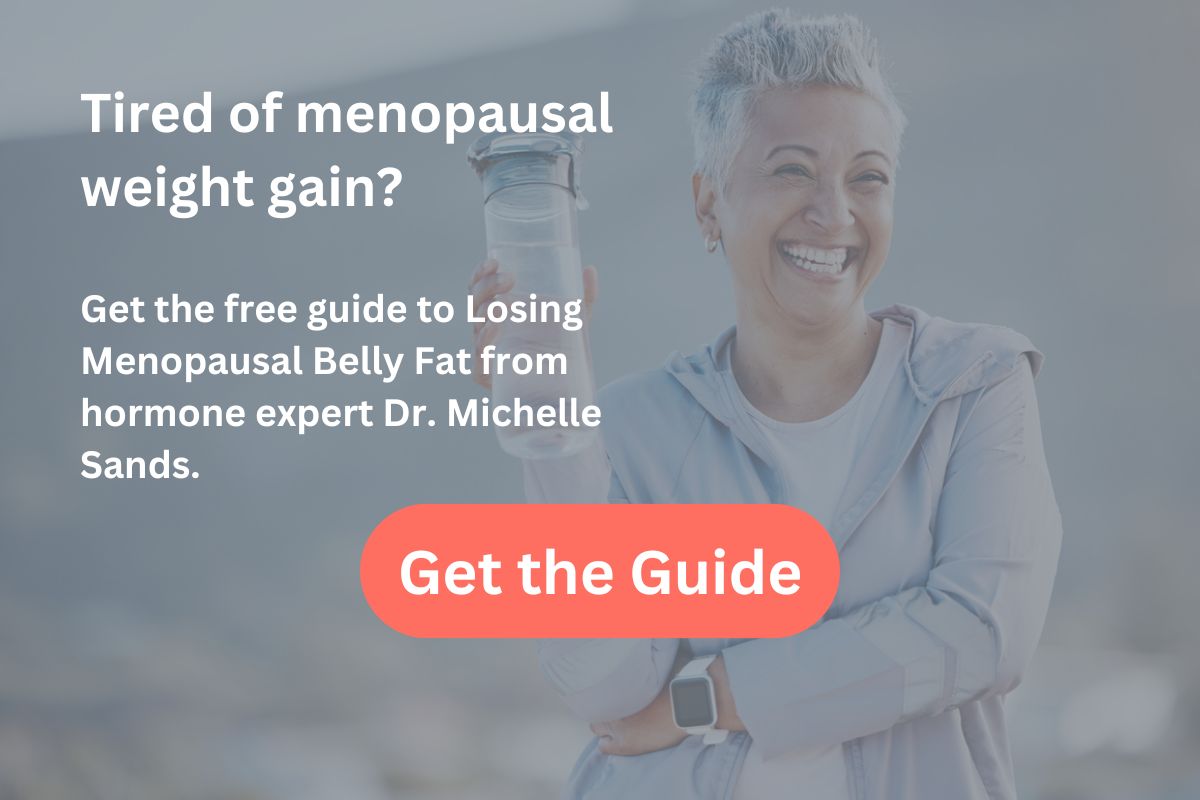It’s no secret that weight gain is a common issue as we age. For both men and women, metabolism peaks around age 20 and begins to drop significantly after age 60.
But for women, menopause adds an extra challenge to the mix. Hormonal changes can compound the aging issue and make it even more difficult to maintain a healthy weight. Hormonal changes during perimenopause and menopause can promote the storage of visceral fat—fat that accumulates around the belly and is linked to negative health outcomes such as insulin resistance, type 2 diabetes, and heart problems.
It can feel like a pretty rotten deal, but don’t despair – there are steps you can take to stop menopausal weight gain and even shed some extra pounds if needed.
How to Stop Menopause Weight Gain
Many women find that a few simple adjustments to their lifestyle can make all the difference. But we’re not talking about counting every calorie or taking on a demanding daily jogging habit.
The key to stopping menopausal weight gain is understanding how menopause is effecting your body, and then making small adjustments to counteract those changes.
Here’s how:
Prioritize Muscle Mass
As we age, our bodies naturally lose muscle mass, which can lead to a slower metabolism. But here’s some good news: you can give your metabolism a boost by lifting weights. Weight training is one of the best ways to increase muscle mass and rev up your metabolism, which means you’ll burn more calories even while you’re resting.
But that’s not all: weight training also has another important benefit for women in menopause. It can help support bone density and prevent bone loss, which is a common issue as we age. So, by prioritizing weight training, you’re not just building muscle; you’re also protecting your bones and reducing your risk of osteoporosis.
You’re busy, and it can be tough to fit everything into your schedule. But if you have to choose between cardio and weights, choose the weights. Weight training is a time-efficient way to boost your metabolism, increase muscle mass, and protect your bones. So, grab those dumbbells and start pumping iron! Your body will thank you for it.
Make it easy. You don’t need a gym membership to start weight training. Try this medicine ball workout for strong, sculpted arms.
Focus on Fiber
Eating plenty of fiber-rich plant foods is important for health at any age, but getting enough fiber becomes even more important for women in perimenopause and menopause.
Fiber supports gut health, can help improve cardiovascular health, helps prevent type 2 diabetes, and may help reduce belly fat by helping you feel fuller for longer.
But the biggest benefit to getting more fiber? It can strike a blow to visceral fat.
According to one study, the secret to visceral fat reduction is simple: eat more soluble fiber from vegetables, fruit and beans.
The study found that for every 10-gram increase in soluble fiber eaten per day, visceral fat was reduced by 3.7 percent over five years.
Eat Plenty of Protein
You gradually begin losing muscle mass in your 30s or 40s through a natural process known as sarcopenia. This process accelerates even more once you hit your 60s. In addition to weight training, you can help retain your existing muscle mass and reduce sarcopenia (age-related muscle loss) by eating plenty of protein.
Not only does adequate protein help you retain and build muscles, but it can also help reduce menopause belly fat.
Studies have shown that protein pacing, spreading out your protein throughout the day, is an effective method for reducing visceral fat, optimizing weight loss, improving cardiovascular health, and managing hunger.
Aim for 1 gram of protein for every pound of ideal body weight.
For example, if your goal weight is 130 pounds, then try to get 130 grams of protein each day. Protein pacing, or spreading your protein out throughout the day, makes this goal easy to achieve. Aim for 25 grams of protein five times a day.
Make it easy: supplement with your favorite protein powder or protein shakes so you can hit your protein goals no matter how busy your schedule.
Optimize Your Sleep
Did you know that getting plenty of high-quality sleep can help you maintain a healthy weight? It’s true! When you get enough sleep, your leptin and ghrelin hormones stay in balance, which helps your brain understand when you’re hungry and when you’re full. But if you don’t get enough sleep, these hormones can get thrown out of whack, leading to excessive hunger and trouble recognizing when you’re actually full.
Unfortunately, most women experience hot flashes during menopause, which can make it difficult to get a good night’s rest.
But fear not – there are steps you can take to improve your sleep quality and keep your hormones in check, even if you’re experiencing hot flashes or cold flashes.
- Swap out synthetic bedding and sleepwear fabrics for breathable material, such as linen, cotton, bamboo, or wool
- Take a hot bath or shower 2 hours before bed
- Go to bed at the same time each night
- Sleep in a dark room
- Turn on a fan or run your A/C
- Avoid caffeine and heavy meals in the hours before bedtime
- Avoid blue light from screens (no cellphones in bed!) for an hour or two before bed
So, don’t underestimate the power of a good night’s sleep! By prioritizing restful sleep and making a few simple changes to your sleep environment, you can improve your hormonal balance and maintain a healthy weight during menopause.
Avoid Ultra-Processed Foods
Avoiding ultra-processed foods can help fight inflammation. And that’s critical during menopause when declining estrogen levels can aggravate systemic inflammation.
Inflammation from menopause can lead to all sorts of unpleasant symptoms, such as digestive tract irritation, heartburn, IBS, eczema and skin rashes, joint pain, dry eyes, vertigo, heart palpitations, and allergies. And chronic inflammation can also be a contributing factor to obesity and weight gain. High levels of chronic inflammation can detrimentally increase leptin, a hormone released from the body’s fat cells that regulates food intake and energy use.
Ultra-processed foods can also aggravate inflammation in your body, adding fuel to the fire.
An anti-inflammatory diet, like the Mediterranean diet, may help reduce symptoms of inflammation during menopause. Stay away from ultra-processed foods, focus on anti-inflammatory foods, and try to cook your foods at home to combat inflammation that can lead to menopause belly fat.
Stop Stressing
If you’re trying to maintain a healthy weight during menopause, one factor that you might not have considered is stress. Whether you’re a stress eater or not, chronic stress can still lead to unexpected weight gain.
One of the main culprits is cortisol, a hormone that is released in response to stress. While cortisol is a normal response to stress, it can wreak havoc on your waistline over time. In addition, chronic stress can increase your risk of depression and anxiety, which can also contribute to weight gain and compound stress issues.
So, what can you do to control stress and minimize cortisol-related weight gain?
One powerful tool is meditation. By making meditation a habit and practicing mindful breathing for just a few minutes each day, you can reduce stress levels and cultivate a sense of calm and serenity.
For many, meditation can seem intimidating or difficult, but don’t be discouraged. There are plenty of resources out there to help you get started, whether it’s a guided meditation app or a local meditation group.
Another way you can mitigate stress-related weight gain is by supplementing with adaptogens—herbs used to help your body better withstand the physical effects of stress. Adaptogenic herbs such as Rhodiola (Rhodiola Rosea), Ashwagandha (Withania Somnifera), and Ginseng may help you stress less over time.
Magnesium is an important nutrient that may also help reduce cortisol levels. Chronic stress and elevated cortisol can deplete your levels of magnesium. On the flip side, adding more magnesium to your diet can help lower cortisol. Magnesium is found in foods such as avocados, bananas, dark chocolate, broccoli, and spinach.
By prioritizing stress reduction, utilizing adaptogens, getting enough magnesium, and making meditation a part of your daily routine, you can support your mental and physical health during menopause and beyond.
Prepare Early
If you’re worried about menopausal weight gain, here is some good news: you can get a head start on beating it by laying the groundwork well before you hit menopause.
Most women experience physical and hormonal changes 4-8 years before full-on menopause, so there’s no time like the present to start implementing healthy habits.
By watching your diet and exercising regularly in the years leading up to menopause, you’ll be way ahead of the game and prepared for an easy transition. But don’t wait until menopause to take charge of your health – start today and enjoy the benefits for years to come.
Remember, menopause is just another milestone on your journey to enlightened maturity. With all the living you’ve done and all the life lessons under your belt, you’re more than capable of creating a healthy lifestyle that keeps you lean, fit, and thriving. So, stay positive, treat your body right, and prioritize restful sleep. And most importantly, enjoy the process of creating a vibrant, healthy life during and after menopause.
Consult your medical provider before starting any diet, exercise, or supplement programs.












Join the GloWell Community on Social!
Don't risk missing a single thing. Follow us on social and become part of the GloWell community.